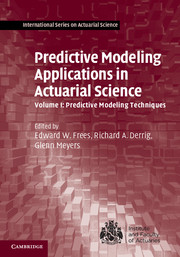Book contents
- Frontmatter
- Contents
- Contributor List
- Acknowledgments
- 1 Predictive Modeling in Actuarial Science
- II Predictive Modeling Foundations
- II Predictive Modeling Methods
- 7 Longitudinal and Panel Data Models
- 8 Linear Mixed Models
- 9 Credibility and Regression Modeling
- 10 Fat-Tailed Regression Models
- 11 Spatial Modeling
- 12 Unsupervised Learning
- III Bayesian and Mixed Modeling
- IV Longitudinal Modeling
- Index
- References
11 - Spatial Modeling
from II - Predictive Modeling Methods
Published online by Cambridge University Press: 05 August 2014
- Frontmatter
- Contents
- Contributor List
- Acknowledgments
- 1 Predictive Modeling in Actuarial Science
- II Predictive Modeling Foundations
- II Predictive Modeling Methods
- 7 Longitudinal and Panel Data Models
- 8 Linear Mixed Models
- 9 Credibility and Regression Modeling
- 10 Fat-Tailed Regression Models
- 11 Spatial Modeling
- 12 Unsupervised Learning
- III Bayesian and Mixed Modeling
- IV Longitudinal Modeling
- Index
- References
Summary
Chapter Preview. This chapter presents statistical models that can handle spatial dependence among variables. Spatial dependence refers to the phenomenon that variables observed in areas close to each other are often related. Ignoring data heterogeneity due to such spatial dependence patterns may cause overdispersion and erroneous conclusions. In an actuarial context, it is important to take spatial information into account in many cases, such as in the insurance of buildings threatened by natural catastrophes; in health insurance, where diseases affect specific regions; and also in car insurance, as we discuss in an application.
In particular, we describe the most common spatial autoregressive models and show how to build a joint model for claim severity and claim frequency of individual policies based on generalized linear models with underlying spatial dependence. The results show the importance of explicitly considering spatial information in the ratemaking methodology.
Introduction
It is important to take spatial information related to insurance policies into account when predicting claims and ratemaking. The most prominent example is the modeling of natural catastrophes needed for the insurance of buildings. Another example is health insurance, where spatial information is relevant for an accurate assessment of the underlying risks, because frequencies of some diseases may vary by region. Frequencies in neighbor regions are often expected to be more closely related than those in regions far from each other. This phenomenon is usually referred to as spatial dependence.
Information
- Type
- Chapter
- Information
- Predictive Modeling Applications in Actuarial Science , pp. 260 - 279Publisher: Cambridge University PressPrint publication year: 2014
References
Accessibility standard: Unknown
Why this information is here
This section outlines the accessibility features of this content - including support for screen readers, full keyboard navigation and high-contrast display options. This may not be relevant for you.Accessibility Information
- 2
- Cited by
